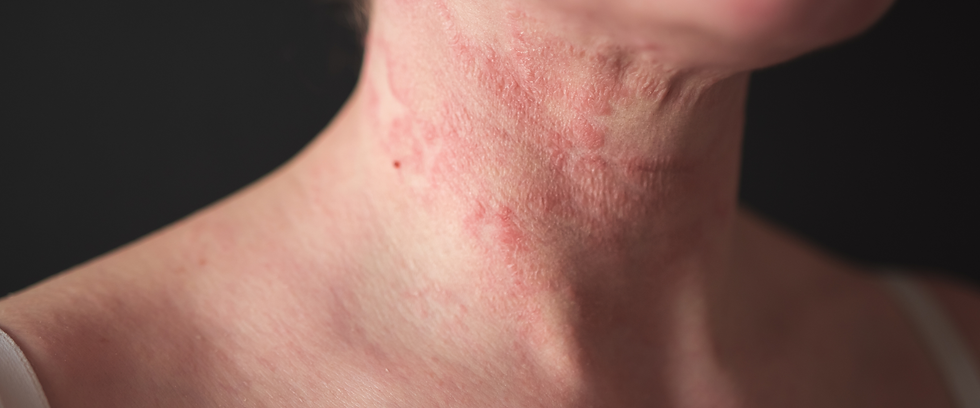Natural Remedies for Hayfever: Ease Symptoms Without Relying on Medication
- Lisa Claire
- May 8, 2025
- 4 min read
Updated: Sep 12, 2025
Hayfever Season is Here

The blossom’s out, the evenings are lighter, and there’s a buzz in the air. But for many, so is the pollen and with it comes itchy eyes, sneezing fits and that lovely "nose like a tap" situation. If this sounds familiar, you're not alone. Luckily, there are natural remedies for hayfever that can make a real difference and most of them start in your kitchen.
According to Allergy UK, up to 30% of adults and 40% of children suffer from allergic rhinitis (that’s the medical term for hayfever). And while it might feel like a harmless seasonal nuisance, it can seriously affect your quality of life especially if you’re already juggling work, kids, perimenopause, and everything in between.
So, what can you actually do about it? Let’s break it down.
What Are the Symptoms of Hayfever?
You might experience one or more of the following:
Itchy, red, or watery eyes
Sneezing and coughing
Runny or blocked nose
Itchy throat, ears, or roof of the mouth
Headaches
Tiredness or brain fog
Loss of smell
Worsened asthma symptoms
Earache or sinus pressure
Fun, right? And for many women, symptoms can worsen during perimenopause when hormone fluctuations heighten histamine sensitivity.
What Causes Hayfever?
Hayfever is an allergic reaction to pollen whether from trees, grasses or weeds that causes the body to release histamine. And histamine is what triggers the cascade of annoying symptoms.
But here’s the interesting bit: your gut, your diet, and your overall inflammation levels can seriously impact how badly you react to pollen.
The GP Approach vs Functional Approach
Your GP might suggest:
Antihistamines
Nasal sprays
Eye drops
Staying indoors (great advice when you’ve got school runs or dogs to walk…)
These can offer some relief but they don’t address why your immune system is overreacting in the first place.
In my clinic, I take a different approach. I look at:
Diet (are you eating histamine-heavy or inflammatory foods?)
Gut health (how’s your gut barrier, and your microbiome?)
Hormones (especially oestrogen and cortisol)
Lifestyle factors (stress levels, sleep, movement)
Natural Remedies for Hayfever: Foods That May Help Relieve Symptoms
Here’s where Mother Nature gets it right these foods have natural antihistamine or anti-inflammatory properties:
Quercetin-rich foods:
A natural antihistamine
Onions, garlic, apples
Berries, kale, red grapes, goji berries
Beta-carotene-rich foods:
Supports mucous membranes (like your nasal lining)
Sweet potatoes, carrots, squash
Peppers, dark leafy greens, apricots
Vitamin C-rich foods:
Helps break down histamine
Blackcurrants, kiwi, mango
Broccoli, courgette, cauliflower
Local honey:
Contains small traces of local pollen that may help build tolerance (Use sparingly it’s still sugar)
Foods That May Make Hayfever Worse
You don’t have to cut everything out, but being aware of your triggers can really help. Watch out for:
High-histamine foods:
Tomatoes, aubergines, spinach
Fermented foods (vinegar, sauerkraut, soy sauce)
Aged cheese, canned fish
Chocolate (sorry…)
Histamine liberators (they trigger your body to release more histamine):
Strawberries
Citrus fruits
Pineapple
Bananas
Egg whites
Other potential aggravators:
Dairy increases mucus production
Wheat can worsen symptoms in grass pollen allergy sufferers
Sugar raises histamine levels and inflammation
What to Drink During Hayfever Season
Water
Always. Keeps mucous membranes hydrated and symptoms less intense.
Green tea
Rich in antioxidants, may help block histamine response.
Nettle tea
A natural antihistamine and anti-inflammatory.
Ginger tea
Helps lower IgE levels the antibodies involved in allergic reactions.
Peppermint tea
Contains menthol, which can relieve sinus pressure and congestion.
Anti-Inflammatory Foods to Support Your Immune Response
Inflammation makes allergy symptoms worse. Eating more anti-inflammatory foods can reduce the burden on your system.
Oily fish salmon, sardines, trout
Flaxseed and walnuts plant-based omega 3s
Olive oil for cooking, dressings or drizzling
Herbs & spices turmeric, ginger, oregano, parsley, cinnamon
Don’t Forget the Gut–Allergy Connection
Poor gut health can lead to increased inflammation and histamine sensitivity. This is especially true for women in perimenopause, when oestrogen fluctuations can affect both gut integrity and immune response.
I often run gut and hormone testing in my clinic to find hidden imbalances that might be making hayfever (and other chronic symptoms) worse. It’s not about elimination diets forever it’s about understanding your body’s unique needs.
You don’t have to rely solely on antihistamines and sprays. With a few smart tweaks to your diet, hydration, and lifestyle, these natural remedies for hayfever can help reduce inflammation, support your immune system, and improve gut health.
Try This Easy Anti-Histamine Smoothie

Packed with vitamin C, quercetin, and antioxidants.
Ingredients:
½ cup blueberries
½ apple (with skin)
Handful of kale or spinach
½ cucumber
1 tbsp flaxseed
Juice of ½ lemon
½ tsp grated ginger
200ml water or coconut water
Blend until smooth and enjoy in the morning or as a mid-afternoon snack.
Want to Get On Top of Your Hayfever This Year?
Hayfever doesn't have to hijack your spring. If you're sick of feeling groggy, bunged up, and foggy-brained from pollen and want a natural, personalised approach that works with your body I'm here to help.
Book your free 20-minute free consultation and let’s chat about how I can support you with hayfever, gut health, or hormone symptoms this season.
Click here to book your call.
About Lisa

I’m Lisa Dack, a qualified, registered Nutritional Therapist with a special interest in gut health, hormonal imbalances, energy, skin issues and sustainable weight loss. I work one-to-one with individuals to uncover the root causes of their symptoms and create personalised nutrition, lifestyle and wellness plans that fit seamlessly into their lifestyles. Whether you’re struggling with chronic fatigue, digestive issues, or hormonal imbalances, I’m here to guide you toward lasting health transformations. Let’s work together to help you feel your best.




Comments